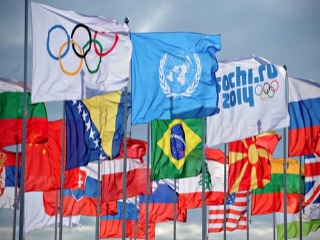Putin Makes the Circassian Issue Part of Russia's Relations with the West
By Valeriy Dzutsev (the 19/02/2014 of the CACI Analyst)
As the international community started to pay greater attention to the North Caucasus because of the Sochi Olympics, ethnic minorities’ complaints in the region significantly increased. In particular, the Circassians became highly vocal about their grievances. Given the authoritarian and increasingly nationalist regime in the Kremlin, the Russian government perceives the rise of activism among Circassians as a security threat. The Olympics served for Moscow as a certain type of litmus test that pointed to the areas of Russia’s vulnerability in the North Caucasus. Now, the aggrieved minorities and the central government appear to be entering a path of confrontation in already volatile region.

Tajikistan Ratifies Agreement with Russia on Tajik Labor Migrants
By Oleg Salimov (the 19/02/2014 of the CACI Analyst)
As reported by an official press release on February 12, 2014, Tajikistan's parliament ratified the recently signed "Protocol of amendments to the Tajikistan-Russia governmental agreement on labor activities of their citizens in the host countries." This protocol came in addition to an earlier agreement signed on October 16, 2004. The ratified amendments extend the validity of work permits issued by Russia to Tajik labor migrants from one to three years. Tajik labor migrants can now stay in Russia longer, without needing to leave and reenter the country every year as was provisioned by the initial agreement.
Georgia and Russia Plan for Presidential Level Meeting
By Eka Janashia (the 19/02/2014 of the CACI Analyst)
Georgian authorities have expressed their readiness to prepare for a top-level meeting between Georgia's and Russia's presidents. The last time the two countries’ presidents met was in July 2008, prior to the August war between Russian and Georgia.
“CACI Analyst, February 05, 2014”
Central Asian Qualms About Eurasian Union Mounting
By Stephen Blank (the 05/02/2014 issue of the CACI Analyst)
The current Ukrainian crisis has focused attention on Russia’s drive to construct a Eurasian Economic Union (EEU) and a customs Union as part of it. But Ukraine is by no means the whole story, as reservations if not resistance to the project mount in Central Asia. Both Kazakhstan and Kyrgyzstan have taken steps to resist Russian encroachments and to raise the price of their admission into this union. In January 2014, Kazakhstan's government launched a plan to re-privatize the crucial Kazakh banking sector, partly in order to shield it from the tactics used by Russian banks to buy up equity in distressed banks under EEU guidelines. Kyrgyzstan also displays an increased desire to force Russia to bargain for Kyrgyzstan’s adhesion to the Customs Union and EEU.


